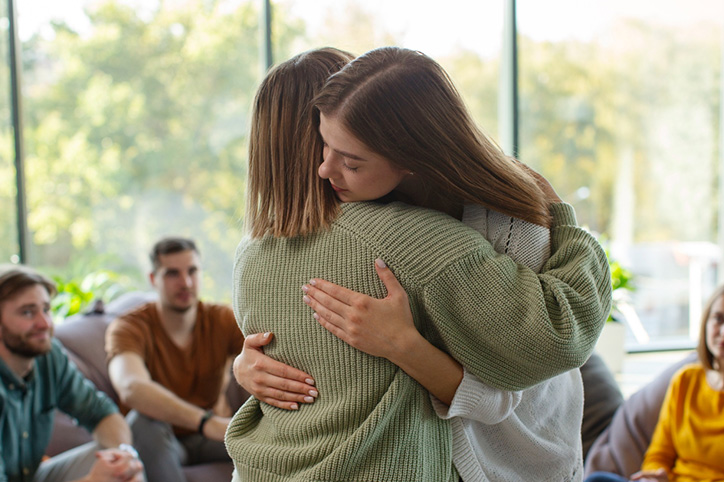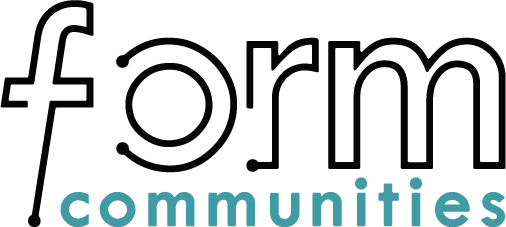Evidence Base for Peer Support
Peer Support is changing lives by directly impacting mental health, and by bolstering many other types of activities, such as employment and housing, that also impact mental health.
The Centers for Medicare and Medicaid Services (CMS) stated in letter SMDL #07-011 “Peer Support support services are an evidence-based mental health model of care which consists of a qualified peer support provider who assists individuals with their recovery from mental illness and substance use disorders.”
Below is a non-exhaustive list of evidence regarding Peer Support
| Study | Program Description | Study Participants | Outcome/Finding |
|---|---|---|---|
| Felton CJ, Stastny P, Shern DL, et al. Consumers as peer specialists on intensive case management teams: impact on client outcomes. Psychiatr Serv 1995; 46(10): 1037-44. | An intensive case-management program with peer specialists. | Recipients of case management (n=104) | Clients served by teams with peer specialists demonstrated greater gains in several areas of QOL and an overall reduction in the number of major life problems experienced |
| Lawn S, Smith A, Hunter K. Mental health peer support for hospital avoidance and early discharge: An Australian example of consumer driven and operated service. J Mental Health 2008; 17(5): 498-508. | Early discharge and hospital avoidance support program provided by peers. | Recipients of peer support (n=49) | 300 bed days and costs were saved by the peer service |
| Sells D, Black R, Davidson L, et al. Beyond generic support: incidence and impact of invalidation in peer services for clients with severe mental illness. Psychiatr Serv 2008; 59(11): 1322-7. | Intensive case-management teams that included peer providers | Recipients of case management (n=137) | Participants who received peer-based services felt that their providers communicated in ways that were more validating and reported more positive provider relationship qualities compared with participants in the control condition. |
| Griswold KS, Pastore PA, Homish GG, et al. Access to primary care: are mental health peers effective in helping patients after a psychiatric emergency? Pri Psychiat 2010; 17(6): 42-5 | Trained peers employed by a local community organization provide a variety of services, including connections to social and rehabilitation services, by arranging appointments and providing transport. | Recipients of psychiatric emergency care (n=175) | Participants with peer support were significantly more likely to make connections to primary medical care. |
| Yanos PT, Primavera LH, Knight EL. Consumer-run service participation, recovery of social functioning, and the mediating role of psychological factors. Psychiatr Serv 2001; 52(4):493-500. | Programs that are staffed and operated completely by self-described mental health consumers provide services such as self-help, activity groups, and drop-in groups | Recipients of mental health services (n=60) | Involvement in self-help services was associated with better community adjustment, the use of more coping strategies, and a greater proportion of problem-centered coping strategies. |
| Corrigan PW. Impact of consumer-operated services on empowerment and recovery of people with psychiatric disabilities. Psychiatr Serv | Consumer-operated services. | People with psychiatric disability (n=1824) | Participation in peer support was positively correlated with recovery or empowerment factors. |
| Nelson G, Ochocka J, Janzen R, et al. A longitudinal study of mental health consumer/survivor initiatives: Part V-Outcomes at 3-year follow-up. J Commun Psychol 2007; 35(5): 655-65. | Consumer / survivor initiatives run by and for people with mental illness. | Participants of peer-run organization (n=102) | Continuously active participants scored significantly higher on a measure of community integration than the non-active group. |
| Galanter M. Zealous self-help groups as adjuncts to psychiatric treatment: a study of Recovery, Inc. Am J Psychiatr 1988; 145(10): 1248-53. | Self-help program designed by a psychiatrist to help participants cope with general psychiatric disorders. | Participants in self-help group (n=356) | A decline was found in both symptoms and concomitant psychiatric treatment after subjects joined the self-help group. |
| Wilson ME, Flanagan S, Rynders C. The FRIENDS program: A peer support group model for individuals with a psychiatric disability. Psychiatr rehabil J 1999; 22(3): 239-47. | Peer group work, including welcoming members, check-in, group discussion, planning a recreational outing and check-out or closure. | Participants in peer support groups (n=165) | Maintained independent or semi-independent living, an increase in the use of community resources and an increase in the size of the social support network. |
| Castelein S, Bruggeman R, van Busschbach JT, et al. The effectiveness of peer support groups in psychosis: A randomized controlled trial. Acta Psychiatr Scand 2008; 118(1): 64- 72. | A closed peer-support group discussing daily life experiences. The group has 16 90-minute sessions biweekly over 8 months. | Users of healthcare centers (n=106) | Peer support groups had a positive effect on social network and social support compared with the control condition. |
Want to Support the Mission?
Whether you’re ready to make a difference with a donation or want to connect with our team about programs, partnerships, or anything else, let’s connect.

Donate to Make an Impact
Your donation helps us increase access to peer-led mental health support, expand inclusive programs, and build healthier communities. Every dollar makes a difference.

Get in Touch
Have a question, idea, or want to work together? Reach out to our team—we’d love to hear from you. Whether you’re an individual, organization, or just curious, we’re here.

